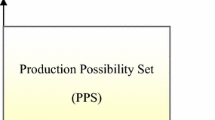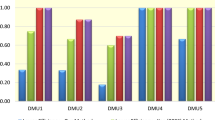Abstract
Data envelopment analysis (DEA) is a non-parametric method for measuring the relative efficiency of a set of decision making units using multiple precise inputs to produce multiple precise outputs. Several extensions to DEA have been made for the case of imprecise data, as well as to improve the robustness of the assessment for these cases. Prevailing robust DEA (RDEA) models are based on mirrored interval DEA models, including two distinct production possibility sets (PPS). However, this approach renders the distance measures incommensurate and violates the standard assumptions for the interpretation of distance measures as efficiency scores. We propose a modified RDEA (MRDEA) model with a unified PPS to overcome the present problem in RDEA. Based on a flexible formulation for the number of variables perturbed, MRDEA calculates the empirical distribution for the interval efficiency for the case of a random number of variables affected. The MRDEA approach also decreases the computational complexity of the RDEA model, as well as significantly increases the discriminatory power of the model without additional information requirements. The properties of the method are demonstrated for four different numerical instances.












Similar content being viewed by others
Notes
This paper has been cited by 88 researchers by 2012 based on Scopus.
References
Agrell PJ, Bogetoft P, Tind J (2005) DEA and dynamic yardstick competition in Scandinavian electricity distribution. J Prod Anal 23(2):173–201
Amirteimoori A, Kordrostami S (2005) Multi-component efficiency measurement with imprecise data. Appl Math Comput 162:1265–1277
Andersen P, Petersen NC (1993) A procedure for ranking efficient units in data envelopment analysis. Manag Sci 39(10):1261–1264
Banker RD, Charnes A, Cooper WW (1984) Some models for estimating technical and scale inefficiency in data envelopment analysis. Manag Sci 30(9):1078–1092
Benayoun R, Montgolfier J, Tergny J, Laritchev O (1971) Linear programming with multiple objective functions: step method (STEM). Math Program 1:366–375
Ben-Tal A, Nemirovski A (1998) Robust convex optimization. Math Oper Res 23(4):769–805
Ben-Tal A, Nemirovski A (1999) Robust solutions of uncertain linear programs. Oper Res Lett 25(1):1–13
Ben-Tal A, Nemirovski A (2000) Robust solutions of linear programming problems contaminated with uncertain data. Math Program 88:411–421
Bertsimas D, Pachamanova D, Sim M (2004) Robust linear optimization under general norms. Oper Res Lett 32:510–516
Bertsimas D, Sim M (2004) The price of robustness. Oper Res 52(1):35–53
Charnes A, Cooper WW, Rhodes EL (1978) Measuring the efficiency of decision making units. Eur J Oper Re 2(6):429–444
Charnes A, Cooper WW, Rhodes E (1979) Short communication: measuring the efficiency of decision making units. Eur J Oper Re 3(4):339
Chilingerian JA (1995) Evaluating physician efficiency in hospitals: a multivariate analysis of best practices. Eur J Oper Res 80(3):548–574
Cooper WW, Park KS, Yu G (2001a) An illustrative application of IDEA (imprecise data envelopment analysis) to a Korean mobile telecommunication company. Oper Res 49:807–820
Cooper WW, Park KS, Yu G (2001b) IDEA (imprecise data envelopment analysis) with CMDs (column maximum decision making units). J Oper Res Soc 52:176–181
Cooper WW, Park KS, Yu G (1999) IDEA and AR-IDEA: models for dealing with imprecise data in DEA. Manag Sci 45:597–607
Despotis DK, Smirlis YG (2002) Data envelopment analysis with imprecise data. Eur J Oper Res 140:24–36
El-Ghaoui L, Lebret H (1997) Robust solutions to least-square problems to uncertain data matrices. SIAM J Matrix Anal A 18:1035–1064
El-Ghaoui L, Oustry F, Lebret H (1998) Robust solutions to uncertain semidefinite programs. SIAM J Optim. 9:33–52
Emrouznejad A, Parker BR, Tavares G (2008) Evaluation of research in efficiency and productivity: a survey and analysis of the first 30 years of scholarly literature in DEA. Socio Econ Plan Sci 42(3):151–157
Emrouznejad A, Rostamy-Malkhalifeh M, Hatami-Marbini A, Tavana M, Aghayi N (2011) An overall profit Malmquist productivity index with fuzzy and interval data. Math Comput Model 54:2827–2838
Emrouznejad A, Rostamy-Malkhalifeh M, Hatami-Marbini A, Tavana M (2012) General and multiplicative non-parametric corporate performance models with interval ratio data. Appl Math Model 36(11): 5506–5514
Entani T, Maeda Y, Tanaka H (2002) Dual models of interval DEA and its extension to interval data. Eur J Oper Res 136:32–45
Estellita Lins MP, Angulo-Meza L (2004) A multi objective approach to determine alternative targets in data envelopment analysis. J Oper Res Soc 55:1090–1101
Farrell MJ (1957) The measurement of productive efficiency. J R Stat Soc Ser A 120(III):253–281
Guo P, Tanaka H (2001) Fuzzy DEA: a perceptual evaluation method. Fuzzy Set Syst 119(1):149–160
Haghighat MS, Khorram E (2005) The maximum and minimum number of efficient units in DEA with interval data. Appl Math Comput 163(2):919–930
Hatami-Marbini A, Emrouznejad A, Tavana M (2011) A taxonomy and review of the fuzzy data envelopment analysis literature: two decades in the making. Eur J Oper Res 214:457–472
Hatami-Marbini A, Saati S, Tavana M (2010) An ideal-seeking fuzzy data envelopment analysis framework. Appl Soft Comput 10(4):1062–1070
Jahanshahloo GR, Hosseinzadeh Lotfi F, Rostamy Malkhalifeh M, Ahadzadeh Namin M (2009) A generalized model for data envelopment analysis with interval data. Appl Math Model 33:3237–3244
Jahanshahloo GR, Matin RK, Vencheh AH (2004) On FDH efficiency analysis with interval data. Appl Math Comput 159:47–55
Kao C, Liu ST (2000) Fuzzy efficiency measures in data envelopment analysis. Fuzzy Set Syst 113(3): 427–437
Kao C (2006) Interval efficiency measures in data envelopment analysis with imprecise data. Eur J Oper Res 174:1087–1099
Kim SH, Park CK, Park KS (1999) An application of data envelopment analysis in telephone offices evaluation with partial data. Comput Oper Res 26:59–72
Lertworasirikul S, Fang SC, Joines JA, Nuttle HLW (2003a) Fuzzy data envelopment analysis (DEA): a possibility approach. Fuzzy Set Syst 139(2):379–394
Lertworasirikul S, Fang SC, Nuttle HLW, Joines JA (2003b) Fuzzy BCC model for data envelopment analysis. Fuzzy Optim Decis Mak 2(4):337–358
Mostafaee A, Saljooghi FH (2010) Cost efficiency measures in data envelopment analysis with data uncertainty. Eur J Oper Res 202:595–603
Park KS (2007) Efficiency bounds and efficiency classifications in DEA with imprecise data. J Oper Res Soc 58:533–540
Park KS (2010) Duality, efficiency computations and interpretations in imprecise DEA. Eur J Oper Res 200:289–296
Sadjadi SJ, Omrani H (2008) Data envelopment analysis with uncertain data: an application for Iranian electricity distribution companies. Energy Policy 36:4247–4254
Sadjadi SJ, Omrani H (2010) A bootstrapped robust data envelopment analysis model for efficiency estimating of telecommunication companies in Iran. Telecommun Policy 34:221–232
Sadjadi SJ, Omrani H, Abdollahzadeh S, Alinaghian M, Mohammadi H (2011a) A robust super-efficiency data envelopment analysis model for ranking of provincial gas companies in Iran. Expert Syst Appl 38:10875–10881
Sadjadi SJ, Omrani H, Makui A, Shahanaghi K (2011b) An interactive robust data envelopment analysis model for determining alternative targets in Iranian electricity distribution companies. Expert Syst Appl 38:9830–9839
Seiford LM, Zhu J (1998) Sensitivity analysis of DEA models for simultaneous changes in all the data. J Oper Res Soc 49:1060–1071
Sengupta JK (1992) A fuzzy systems approach in data envelopment analysis. Comput Math Appl 24(8–9):259–266
Shokouhi AH, Hatami-Marbini A, Tavana M, Saati S (2010) A robust optimization approach for imprecise data envelopment analysis. Comput Ind Eng 59(3):387–397
Simar L, Wilson P (1998) Sensitivity analysis of efficiency scores: how to bootstrap in nonparametric frontier models. Manag Sci 44(11):49–61
Simar L, Wilson P (2000) A general methodology for bootstrapping nonparametric frontier models. J Appl Stat 27(6):779–802
Smirlis YG, Maragos EK, Despotis DK (2006) Data envelopment analysis with missing values: an interval DEA approach. Appl Math Comput 177(1):1–10
Soyster AL (1973) Convex programming with set-inclusive constraints and applications to inexact linear programming. Oper Res 21:1154–1157
Tavana M, Khanjani Shiraz R (2012) Fuzzy stochastic data envelopment analysis with application to base realignment and closure (BRAC). Expert Syst Appl 39(15):12247–12259
Toloo M, Aghayi N, Rostamy-malkhalifeh M (2008) Measuring overall profit efficiency with interval data. Appl Math Comput 201:640–649
Wang K, Wei F (2010) Robust data envelopment analysis based MCDM with the consideration of uncertain data. J Syst Eng Electron 21(6):981–989
Wang YM, Greatbanks R, Yang JB (2005) Interval efficiency assessment using data envelopment analysis. Fuzzy Set Syst 153:347–370
Yu JR (2007) IDEA by multiple objective programming. Int J Innov Comput I 3(1):21–29
Zhu J (2003) Imprecise data envelopment analysis (IDEA): a review and improvement with an application. Eur J Oper Res 144:513–529
Acknowledgments
The authors would like to thank Prof. Stefan Minner, Managing Editor of OR Spectrum, for his admirable support. They also would like to thank the anonymous reviewers for their insightful and constructive comments. This research project is partially supported by the French Community of Belgium ARC project on managing shared resources in supply chains.
Author information
Authors and Affiliations
Corresponding author
Additional information
All authors made an equal contribution to this work.
Rights and permissions
About this article
Cite this article
Shokouhi, A.H., Shahriari, H., Agrell, P.J. et al. Consistent and robust ranking in imprecise data envelopment analysis under perturbations of random subsets of data. OR Spectrum 36, 133–160 (2014). https://doi.org/10.1007/s00291-013-0336-5
Published:
Issue Date:
DOI: https://doi.org/10.1007/s00291-013-0336-5




